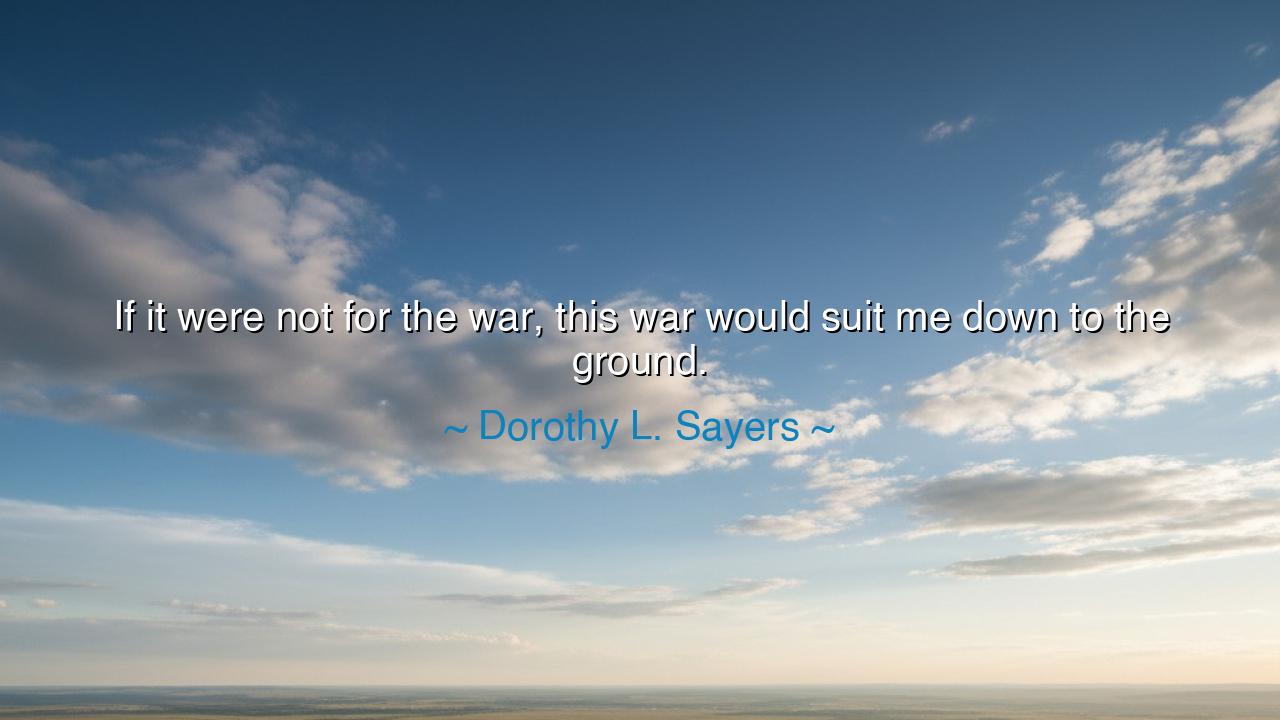
If it were not for the war, this war would suit me down to the






Hear, O seekers of wisdom, the ironic yet piercing words of Dorothy L. Sayers, who declared: “If it were not for the war, this war would suit me down to the ground.” In this sharp paradox, she captures the strange duality of human experience in times of conflict: the unsettling truth that war, while it shatters lives and nations, can also reorder society in ways that unexpectedly favor individuals—especially those who were overlooked or confined in times of peace. It is both lament and revelation, for in the fire of destruction some discover freedoms they had long been denied.
Sayers, a writer and thinker in the early twentieth century, lived through the chaos of the Second World War. Like many women of her generation, she witnessed a society shaken to its roots. Men went off to the front, leaving roles and opportunities unfilled. Women, long kept in the shadows of domesticity, were called into offices, factories, and institutions, their talents recognized out of necessity. For some, including Sayers, this shift created space to thrive in public and professional life. Thus, the bitter irony of her words: if only the suffering of war could be stripped away, its side effects—the opportunities, the reordering, the recognition of overlooked gifts—might have been welcomed.
This paradox was seen far beyond Sayers herself. Consider the women who built the planes, ships, and weapons in Britain and America, the iconic “Rosie the Riveter” figures who proved their strength in industry. For them, the war broke open doors that had long been locked. The same was true for intellectuals and artists whose voices, once marginal, were now urgently needed to speak to a society in upheaval. Yet always, behind the new opportunities, lay the shadow of loss: bombed cities, rationed bread, the dead never returning home.
The irony Sayers voices is one found throughout history. In the French Revolution, the collapse of monarchy brought blood and terror, yet it also ignited ideas of liberty and equality that reshaped the world. In the American Civil War, unimaginable suffering coexisted with the birth of emancipation. War, though a scourge, often forces societies to transform, sometimes granting new freedoms or accelerating justice—but always at a cost too heavy to rejoice in without bitterness.
Sayers’s words are thus both sardonic and mournful. She knew that war is never to be desired, for its essence is destruction. Yet she also recognized the hypocrisy of a society that only under pressure grants to women and the marginalized the roles they should have possessed all along. Her statement is a subtle rebuke: why must humanity wait for calamity to see the worth of those it neglects? Why should the gifts of half the population only be valued when the world is burning?
The lesson here is twofold. First, it is a warning against romanticizing war: though it may bring change, it does so through suffering that no good can ever justify. Second, it is a call to courage and justice in times of peace: to grant recognition, opportunity, and dignity without waiting for crisis to force our hands. The freedoms glimpsed in war should not vanish when peace returns; rather, they should be made permanent, woven into the new fabric of society.
Therefore, O children of tomorrow, let this be your wisdom: do not wait for calamity to force change. Do not let justice, equality, and creativity be born only in fire and loss. Learn from Sayers’s paradoxical lament, and build in peace what others had to wrestle from war. For if war creates opportunities, it is only because peace was blind; and if we would honor the fallen, we must ensure their sacrifices bring forth a world where such blindness need never return.






CHHoang Chi Hieu
There’s a dark humor in this line that really captures wartime irony. The phrasing feels almost casual, yet it hides something tragic — that someone could find personal alignment with a world in chaos. It makes me wonder whether Sayers is criticizing the way society glamorizes conflict. How many people during wartime discovered they were ‘made for it,’ and what does that say about our relationship with violence and purpose?
ANTram Anh Nguyen
I read this quote as a reflection on moral contradiction. It’s as though the speaker recognizes that war creates the kind of intense, dramatic world they secretly crave — full of urgency, meaning, and action — yet they can’t escape the reality that it’s built on pain and loss. It’s a brutally honest acknowledgment that not all fulfillment comes from good circumstances. Some people only feel alive in crisis.
GDGold D.dragon
I sense a layer of self-awareness here — maybe even guilt. It’s as if the speaker admits they are thriving under conditions that destroy others. That paradox fascinates me: how can war bring out both the best and worst in someone? Maybe Sayers wanted to show how complex human nature is — that even when surrounded by suffering, people can find strange forms of satisfaction or usefulness.
DHDo Dai Hoc
This quote feels like a sharp satire of human adaptability. The idea that war could ‘suit’ anyone reveals how people rationalize the worst situations to find meaning or belonging. It makes me question — are we all capable of turning horror into habit if it benefits us somehow? It’s unsettling how easy it is to slip from moral outrage into convenience when survival or pride is at stake.
AABC
I find this statement both unsettling and intriguing. It makes me wonder about people who discover their sense of purpose or identity in times of conflict. Can a person truly ‘suit’ a war without losing their humanity? Or is Sayers perhaps mocking the absurdity of finding personal satisfaction amid destruction? It’s a clever line that exposes how war distorts not only morality but also self-awareness.